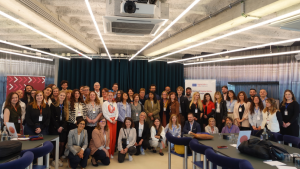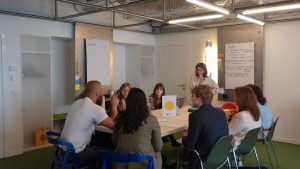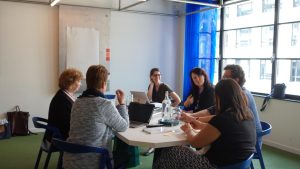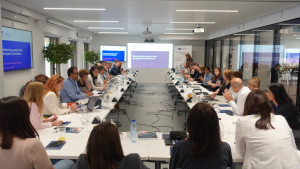On 4 – 5 July 2024, Brussels buzzed with excitement for the 3rd annual National Coalitions for Digital Skills and Jobs meeting, hosted by the Digital Skills and Jobs Platform. Over 50 participants from all across the EU joined the event to celebrate the winners of the European Digital Skills Awards 2024.
The event brought together National Coalitions, the Jury Members of the European Digital Skills Awards 2024, Awards winners, representatives from the European Commission, and other key players in the digital skills and jobs field. On the second day, National Coalitions representatives had plenty of time to network and share insights and different perspectives on the key aspects of their work.

National Coalitions, assemble!
The 2024 annual meeting for National Coalitions had several key goals. It aimed to update participants on the latest news from the European Commission and the Digital Skills and Jobs Platform. The event was also an opportunity for National Coalitions to connect, share best practices, and discuss challenges, with the goal of co-developing solutions to achieve the Digital Decade targets.
The meeting focused on exploring new ways for National Coalitions to engage with European Commission activities and involve their national networks in various initiatives. Additionally, it sought to find effective methods for promoting activities both at the national level and on the Digital Skills and Jobs Platform. Another important aspect of the meeting was to advance collaborative work through the Squad Assessment Working Groups. This provided members with a chance to present their progress, gather feedback, and refine their contributions.
A year all about digital skills
Rehana Schwinninger-Ladak, Head of Unit for ‘Interactive Technologies, Digital for Culture and Education’ at the European Commission’s Directorate-General for Communications Network, sent a video message to welcome National Coalition representatives to the 3rd Annual Meeting in Brussels.
Vitis Faure Tilgaard, Policy Officer at DG CNECT, highlighted the achievements of the European Year of Skills, noting its success in raising awareness of skills policies and the Digital Skills and Jobs Platform. She shared that the Commission is currently undertaking a review of the Digital Education Action Plan, presented the takeaways from the recently adopted State of the Digital Decade Report 2024, and spoke about current and upcoming calls related to digital skills under the Digital Europe Programme in the context of expected increases in the demand for advanced digital skills.
Apply now for the DIGITAL Europe Programme 7th Call on Advanced Digital Skills! Check out the master slides and recording of the info day.
Tomislava Recheva from European Schoolnet shared an update on the Digital Skills and Jobs Platform’s key accomplishments over the past year. With more than 12,150 users, the Platform has played a crucial role in highlighting gaps in both basic and advanced digital skills. Key improvements, such as the new Content Recommender, have made the user experience more personalized and effective. Successful partnerships and engaging campaigns have further fueled the Platform’s growth and increased user involvement.
Ioanna Tsotsou reviewed recent coordination meeting topics, while Mara Jakobsone highlighted the importance of collaboration within National Coalitions. Participants also received insights from the jury members of the European Digital Skills Awards 2024 on their approach and experiences.
Lightning Talks: National Coalitions’ good practices and future sparks
For the first time in the annual meeting, National Coalitions (NCs) participated in a “Lightning Talk” session. Each Coalition had a 5-minute slot to present their highlights and main achievements. This format provided a platform for NCs to showcase their successes and innovative strategies, celebrate accomplishments, and foster cross-border learning, collaboration, and knowledge transfer. The Lightning Talks invited National Coalitions to reflect on past challenges and share their future plans, enhancing the exchange of ideas and experiences.
The interactive workshop
Following the lightning talks, attendees took part in an interactive workshop session, divided across six tables with different themes.
-
Women 4 Cyber: How can we close the gender gap in cybersecurity?
-
AI in Education – challenges and solutions (2 groups)
-
Micro-credentials and personal learning accounts (PLA)
-
How can companies address the shortage of ICT professionals? (2 groups)
Each group was given the task of identifying the main challenges they faced, brainstorming potential solutions, and outlining specific actions they could take to implement these solutions. Moderators from the Platform team facilitated the discussions, ensuring the conversations stayed on track. Meanwhile, notetakers documented the key points and ideas on a structured Miro Board for clarity and organization

Representatives from the National Coalitions played a supportive role in moderating the sessions and later presented the findings and outcomes to all the participants in the workshop, ensuring that everyone was informed and could contribute to the next steps.
Our Solutions
To increase women’s participation in cybersecurity, it’s essential to introduce female mentors who can inspire and guide students, provide financial support to overcome barriers, and showcase the diverse career opportunities within the field. Enhancing critical thinking and integrating AI in education should involve not only demonstrating AI’s benefits to teachers but also creating working groups to set high-quality data standards. This can be complemented by offering training to incorporate AI into traditional teaching methods. Micro-credentials can be promoted through clear guidelines, national badges, and stakeholder workshops to ensure better recognition and understanding.

To develop ICT skills, EU-wide legislation should support digital infrastructure and research, alongside making STEM fields more appealing through gamification and flexible work conditions. Offering practical courses and fostering strong partnerships between universities, training providers, and IT companies can further support this goal. Additionally, recognizing non-formal qualifications, such as experience-based certifications, and aligning national frameworks with EU standards can significantly enhance recruitment processes and career mobility within the sector.
National Coalitions and European Commission networking session
On the second day of the annual meeting, 5 July, National Coalition representatives gathered together with European Commission officials for a networking session. The core points of the discussion were: Role and recognition of National Coalitions at Member State and EU level, Activities for National Coalitions DSJP network development, Suggestions addressing Digital skills funding, reporting and information sharing at EU level

Thank you to everyone who attended the Annual National Coalitions for Digital Skills and Jobs meeting in Brussels. Together, we’re making great strides in digital skills across the EU, and we look forward to continuing this important work!
